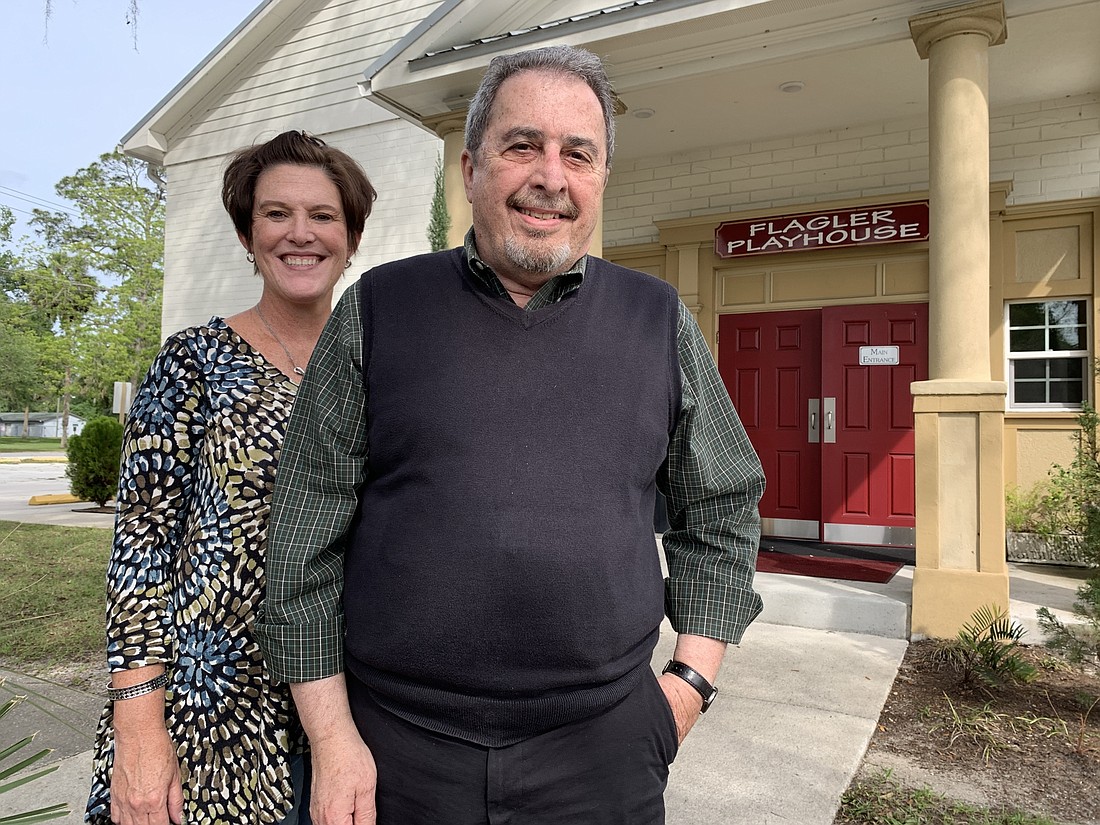- April 22, 2024
-
-
Loading

Loading

What does it mean to be a professional? One definition is that you’re paid for what you do. Like most community theaters, the Flagler Playhouse doesn’t pay its actors and gives only a small stipend to the directors. But new artistic director Paul Prece, of Ormond Beach, likes to think of it as an approach.
“You always work professionally,” he said. “You do what you do based on the practices of the professional theater.”
Prece, who retired from the university life in 2017 so that he could live near the beach, didn’t intend for his retirement to be a “step into my casket.” He answered an ad when the playhouse was looking for its next director, and he was quickly brought in by the Board of Directors, which was impressed by his 30 years of experience in all levels and roles of theater.
He and Jerri Berry, who is now the president of the Flagler Playhouse, joined the board together in July 2019. They met with the Palm Coast Observer at the playhouse, in downtown Bunnell, in April, as preparations were underway for “Talking With …”, the first performance since before the pandemic.
Prece: It’s a living art form. The performance is happening in front of the audience only once. I had a friend who was a songwriter, and he wrote a song called “Live Music Only Happens Once,” which is sort of the same idea. It may have been performed 25 times in a row, but each time it’s different.
It’s a shared experience among audience members, as well as the actors on stage. If the cast is six people, sometimes we call the audience the seventh actor. We rehearse, and the last step is we ask an audience to attend. You want to hear the sighs, the cries, the laughter, because that also affects the actors.
Berry: Theater is a way to bring people together, to share experiences, share the story. That’s the reason I got involved in theater — to be in something bigger than myself and meet people with a similar passion. There have been certain shows that I have met people that I have felt like an extension of myself, like family members almost. We get very close, and it happens in almost every show.
As an audience member, it’s like Paul said: It’s a totally different vibe watching live theater. You can be part of the show.
Prece: At the end of a play, you applaud as the actors come up to take their curtain call. It’s because they know the actors are live, they’re saying, “Thank you for doing this for us.”
Berry: It’s different in that you don’t have anyone else to play on; it’s you, all by yourself. If you mess up, you have to figure out in your own head how you’re going to get out of this and back on track without losing the story. If you’re talking to the audience in the monologue, they are like another player.
Prece: You should learn as much about a play as you perform it as you do rehearsing it. You let the audience lead you.
Berry: I do have a trick, and it’s one that Paul actually taught me. It’s worked!
Prece: I don’t use the word “memorize” ever. I say, “Learn your words.”
Berry: Work on one paragraph at a time. It’s more about getting the meaning of the words. Then you add a second paragraph, and a third.
Berry: A sense of pride. It’s not always easy, even for a somewhat confident person. There’s not a day that the nerves don’t get to you. So there’s a sense of accomplishment. There’s a sense of community with the backstage crew, with everybody — and the audience.
Prece: We use the word “ensemble,” which means “together,” in French.
Every single show you do is a singular experience.
Berry: It’s the one thing that I do just for me because I just genuinely like it. I have fun.
Prece: Some people who are shy, when they get on stage, it opens them right up.
I think people do it because it’a special thing. You meet people who have common interest.
It’s an avocation on this level. There may be some people who aspire to greater things, but this is where they get their sea legs, where they get to practice.
Prece: Just learning their language. Every single person in the play speaks a different language, tones of voice, how we communicate. With some people, you have to say, “Just say it faster,” and they get it. And with others you have to say, “Do it like you’re a squirrel running across the street.” They understand that imagery.
Berry: As an educator, I’m going to tell this kid the same thing as I tell that kid, but in totally different ways.
Prece: It’s learning how they accept it. For some people, if you are kidding, you have to (wink).
You don’t have to intimidate or scream. If that’s what you think you have to do, that has something to do with your upbringing, I guess. You attract more flies with honey than with vinegar.